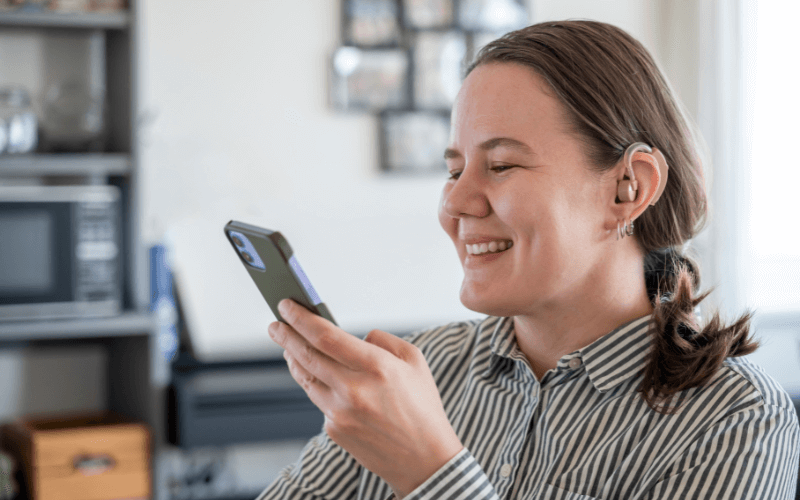Navigating NDIS Funding for Assistive Technologies
Access to the right assistive technology can mean the difference between dependence and independence. For people with disability, technologies like personal alarms, fall detectors, and home monitoring systems are not just helpful — they're essential for daily safety, dignity, and wellbeing.
In this blog:
The National Disability Insurance Scheme (NDIS) was created to provide equitable access to essential supports for people with disability. However, navigating the funding process for assistive technology can be complex without the right guidance. At Tunstall Healthcare, we’re here to help. As a registered NDIS provider, we offer tailored assistive technology solutions and expert support to guide you every step of the way.
What Is Assistive Technology?
Assistive technology (AT) refers to the systems and equipment that support people with disability to perform daily tasks more safely, independently, and confidently. According to the World Health Organization, AT enables individuals to live healthy, productive, and dignified lives by improving their functional abilities.
Examples range from basic tools like walking frames and hearing aids to more advanced solutions such as personal alarms, environmental control systems, and fall detectors. These technologies play a key role in supporting older adults and people with chronic health conditions or physical impairments. At its core, AT is about removing barriers and ensuring that people can participate fully in their communities.
What is NDIS Funding For Assistive Technology?
The National Disability Insurance Scheme (NDIS) defines assistive technology (AT) as supports that are directly related to a participant’s disability and considered reasonable and necessary to help them carry out essential activities. These supports must help the person work towards the goals outlined in their NDIS plan, represent value for money, and be appropriate and effective for their unique needs.
Assistive technology is commonly funded when it helps to improve safety at home or in the community, increase independence, support mobility, or reduce the need for intensive personal care. For example, a monitored personal alarm may be considered a reasonable and necessary support for someone who lives alone and wants to manage the risk of falls or sudden health issues without compromising their independence.
Ultimately, the NDIS focuses on whether a particular technology will help the participant live their life with more confidence, dignity, and control. When the right assistive technology aligns with a person’s goals, it can support not only day-to-day functions but also long-term well-being and inclusion.
However, access to assistive technology varies across Australia. Research indicates that barriers still exist, particularly for people in rural or lower-income areas. The report calls for a more nationally consistent, needs-based approach to funding both assistive technology and home modifications. This highlights the importance of working with experienced providers like Tunstall, who can guide you through the process and help you access the most suitable supports with confidence.
With the right technology and trusted guidance, assistive technology becomes a tool for independence, safety, and a life lived with greater choice and freedom.
Can You Get NDIS Funding for Personal Alarms?
Yes, you can. Personal alarms can often be funded through the NDIS, especially when they align with goals related to safety, fall prevention, or living more independently.
At Tunstall Healthcare, our range of NDIS personal alarms is eligible for funding and backed by our 24/7 professional monitoring team. These devices are designed to connect you to assistance quickly at the press of a button, whether you're at home, out and about, or supported by a carer.
Our personal alarm solutions approved for NDIS funding include:
In-home alarms, such as Lifeline Digital and NOVO, offer reliable emergency response and smart home integration
Mobile personal alarms like the Gem4 and Gem5, which include GPS tracking, fall detection, and two-way voice communication
Fall detection accessories, including the Vibby Fall Detector, for added protection and automatic alerts
These alarms are user-friendly, discreet, and suitable for a variety of living situations. Whether you're living independently, with loved ones, or in supported housing, Tunstall’s technology is built to enhance safety, confidence, and peace of mind.
Related Reading: NDIS Support Coordination: What Is It, and How Do I Get It?
How to Include Assistive Technology in Your NDIS Plan
Understanding how to add assistive technology to your NDIS plan can make a significant difference in getting the supports you need. The NDIS assistive technology access process outlines the key steps, and working with a knowledgeable provider like Tunstall can make the process smoother and more personalised.
Here’s how to get started:
1. Link the Technology to Your Personal Goals
Your NDIS plan is built around your goals, so it’s important to clearly define how the technology will support your day-to-day life. Goals might include:
Living safely and independently at home
Reducing reliance on carers
Managing health risks like falls
Staying connected with family or community
For example, a personal alarm may support your goal of living independently and feeling safer when at home or in the community.
2. Get the Right Assessments
Depending on the complexity and cost of the technology, you may need an assessment or recommendation from an allied health professional, such as an occupational therapist. This helps demonstrate that the support is:
Suitable for your specific needs
Cost-effective and safe
Likely to improve your ability to participate in daily life
Tunstall can help coordinate with your support team to ensure the required documentation is prepared and submitted properly.
3. Understand the NDIS Budget Categories
Assistive technology supports are usually funded under one of two categories in your NDIS plan:
Core Supports: This budget covers low-cost, low-risk items that do not require formal assessment or customisation. Examples might include basic personal safety devices or simpler home aids.
Capital Supports: This category covers higher-cost or more specialised technology that may require professional setup or monitoring. Many of Tunstall’s monitored personal alarms fall under this category, as they often involve 24/7 response services, GPS tracking, or smart integrations.
Understanding where your support fits helps ensure it’s budgeted correctly and avoids delays in approval.
4. Work With a Registered Provider
Working with a registered provider ensures you receive NDIS-compliant products and trusted guidance throughout the process. As a registered NDIS provider, Tunstall can assist with:
Recommending the right device for your needs
Supplying quotes and product information for your planning meeting
Providing ongoing support, including device setup, maintenance, and 24/7 monitoring
Communicating directly with your plan manager or support coordinator
We aim to simplify the process and support you confidently through each step, from assessment to setup. Read more about Tunstall NDIS solutions here.
Related Reading: Effective Strategies for Managing Your NDIS Funding
Ready to Get Started?
At Tunstall, we believe that everyone deserves to feel safe, connected, and in control of their everyday life — and we’re here to help make that possible. Whether you're new to the NDIS or simply looking to update your plan with more suitable technology, we'll work alongside you, your carer, or support coordinator to ensure the process is clear, personalised, and stress-free.
Our team understands how important it is to align the right technology with your personal goals, lifestyle, and support needs. We’ll help you choose the best device, navigate the funding process, and set everything up with confidence and care.
Learn more about personal alarms and how they can support your safety, wellbeing, and independence, or request a quote today to speak with our friendly team and explore your NDIS funding options.
→ Learn more about personal alarms and how they can support your safety, wellbeing, and independence.
→ Or request a quote today to speak with our friendly team and explore your NDIS funding options.
Keep reading:Navigating NDIS Funding: A Comprehensive Guide to Management Options




